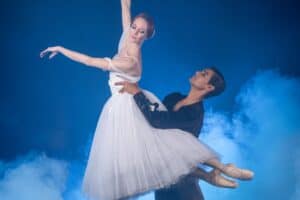Willy Russell's Blood Brothers is a very successful musical, having run for nearly a quarter of a century in the West End.

David Kramer’s adaptation of the piece, which relocates the action from Liverpool to Cape Town, is the first major overhaul of the story in all that time. How did that come about?
“I had always thought that Blood Brothers would adapt well to Cape Town,” Kramer says ahead of the Johannesburg run (the show has already premiered at Theatre on the Bay).
“It’s the only time I’ve ever wanted to adapt something. It’s a great fit. It includes things like forced removals, which we know all about. And it speaks to a working-class audience. Taliep Petersen and I had the same experience with District Six, when we had people coming to the theatre for the first time in their lives.”
Kramer first saw Blood Brothers in London in the Eighties.
“I made enquiries about doing an adaptation at the time, but nothing came of it,” he says.
“Then I heard that Pieter Torien had bought the rights, so I approached him with my idea. He was pleased, and set up a meeting with Willy Russell’s agent in Cape Town. That went well, and I was asked to send a section of the adaptation – which I hadn’t written yet.
“I did the first 25 pages while I was on holiday in Paternoster last year and sent it off. Then in June this year, I went to London to have lunch with Willy, and he gave his final approval. I think meeting me helped, as he was otherwise very cautious. We have similar ideas of what theatre can and should be. When the whole adaptation was done, I spent another week with him. He was very particular about retaining what he called the ‘specifics’ of the story, and he was glad to relook the lyrics.”
That latter point was not necessarily expected up front.
“It was interesting,” muses Kramer.
“There was stuff that he felt uncomfortable about having written, but he had never changed it. I’m always keen to revisit and fix something if I think it was weak.”
Was the “Englishness” of the original a challenge, either in terms of adapting it or for keeping it recognisable for a wide South African audience?
“It was, but I only became aware of that later, as I considered the Cape Town context,” Kramer says.
“It wasn’t written in Scouser slang, which would have been tricky. It’s more like standard English, but with touches of a different syntax. My challenge was to write in English but to make it sound Afrikaans. Willy was very enthusiastic about it.”
Since discovering Blood Brothers in the Eighties, Kramer has had extensive West End experience himself. How has that affected his perspective on the piece and the industry in general?
“Adapting work on the page is an exercise in itself,” says Kramer.
“To start with, I wasn’t sure how far it would go, so I was very respectful; I didn’t want to re-invent the story. It still unfolds as it does overseas, which I think makes it credible.
“It’s not a conventional musical, though. There’s a very cinematic feel to the writing. Normally, there are 11 or so scenes in the first half, and then between seven and nine in the second act, all using the same sets repeatedy. In Blood Brothers, there are 35 scene changes.
“If staged in a traditional way, it can get tedious; it becomes almost Brechtian,” smiles Kramer.
“In the re-imagining, I use a lot of projections, and we’ve had success with those. I am pleased that this production is very different to the West End version.”
At a time when there’s a drive to create original South African theatre, how does this piece fit in?
“My first interest is always in telling local stories,” says Kramer.
“It’s a passion of mine to discover our identities. Mine is particularly Western Cape – I’m a regional writer. This show is refreshing because it’s not about race. It’s about class and privilege, and it plays out within a community. It’s a universal story written by an expert playwright, but the adaptation makes it feel like something I would have told.
“But I had the advantage of starting with something great.”
Support Local Journalism
Add The Citizen as a Preferred Source on Google and follow us on Google News to see more of our trusted reporting in Google News and Top Stories.









